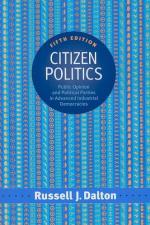|
This section contains 5,797 words (approx. 20 pages at 300 words per page) |

|
Definitions
Political parties have been defined both normatively, with respect to the preferences of the analyst, and descriptively, with respect to the activities in which parties actually engage. Normative definitions tend to focus on the representative or educational functions of parties. Parties translate citizens' preferences into policy and also shape citizens' preferences. Parties are characterized as "policy seeking." Thus, Lawson (1980) defines parties in terms of their role in linking levels of government to levels of society. She states, "Parties are seen, both by their members and by others, as agencies for forging links between citizens and policy-makers." Von Beyme (1985, p. 13) lists four "functions" that political parties generally fulfill: (1) the identification of goals (ideology and program); (2) the articulation and aggregation of social interests; (3) the mobilization and socialization of the general public within the system, particularly at elections; and (4) elite recruitment and government formation.
Descriptive definitions...
|
This section contains 5,797 words (approx. 20 pages at 300 words per page) |

|


